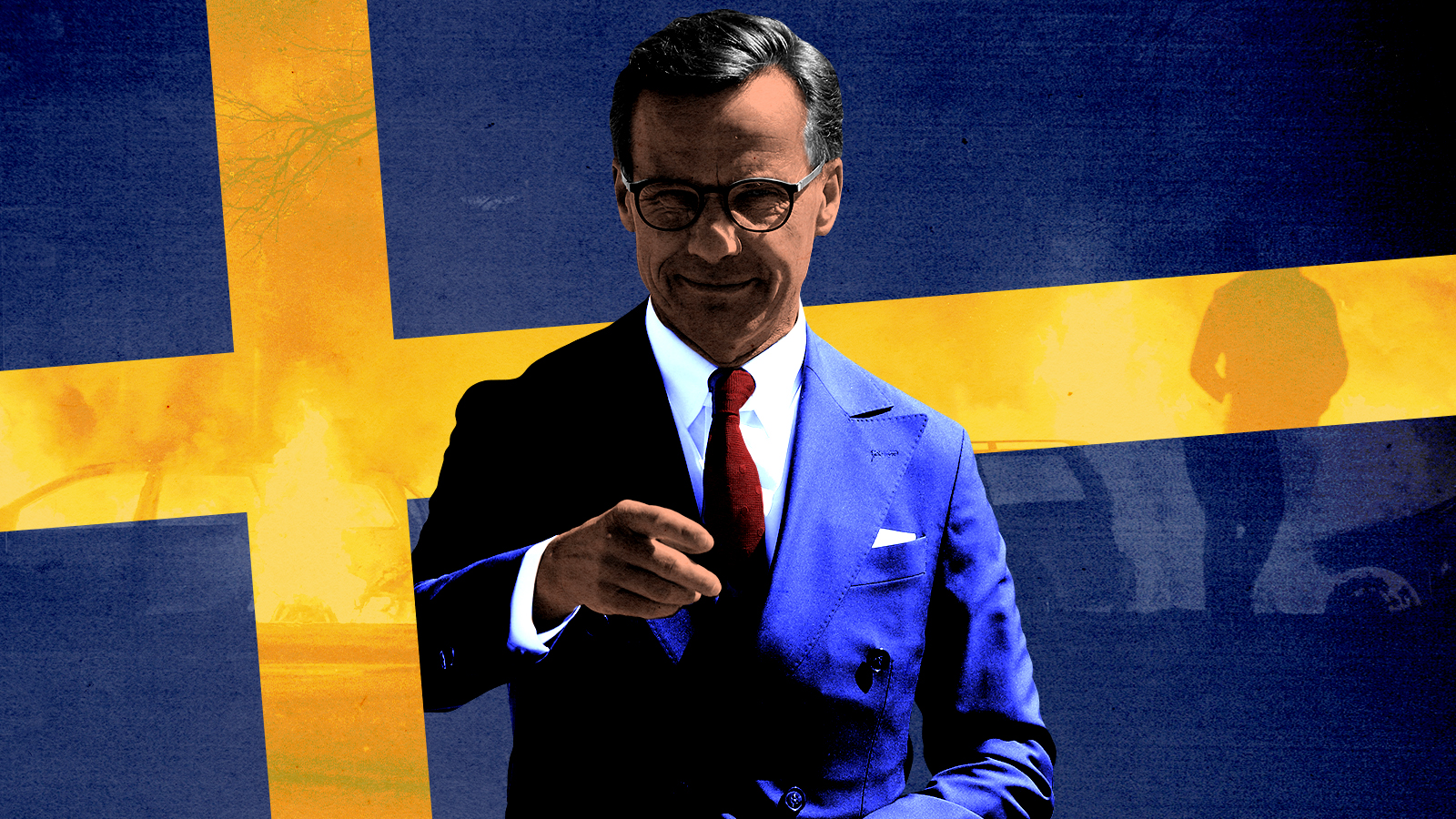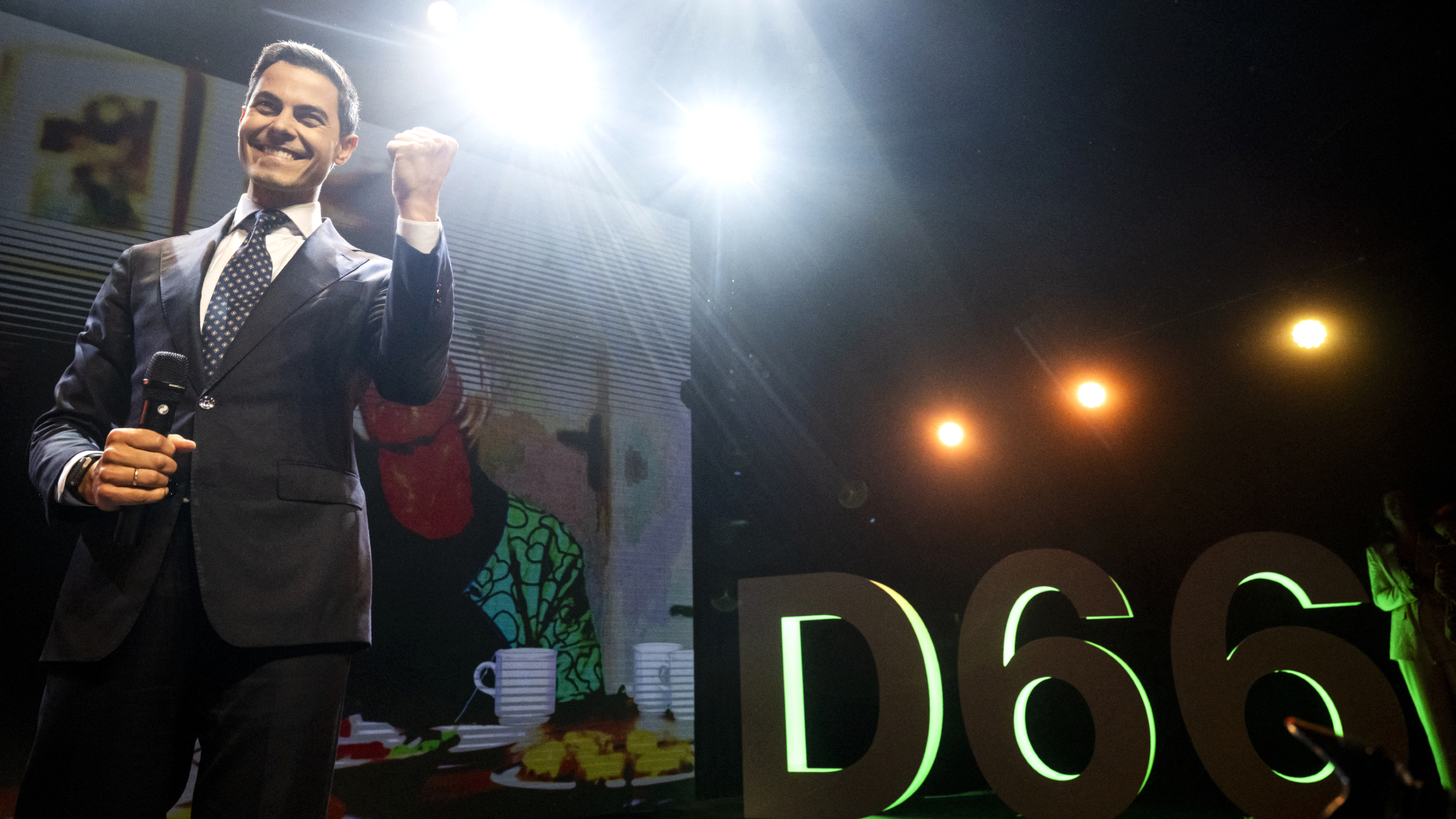The rise of the Swedish far-right
Ulf Kristersson is being called the 'far-right's locksmith' for opening the door in Sweden to a neo-Nazi-linked political party


A free daily email with the biggest news stories of the day – and the best features from TheWeek.com
You are now subscribed
Your newsletter sign-up was successful
The Swedish Parliament elected a new prime minister, Ulf Kristersson, who is backed by the far-right party the Sweden Democrats. What does this mean for the country? Here's everything you need to know:
Who is Ulf Kristersson?
Sweden elected 58-year-old Ulf Kristersson, the center-right leader of the Moderate Party, to be prime minister with a slim margin of 176 votes to 173. He defeated sitting Prime Minister Magdalena Andersson, who leads the center-left party, the Social Democrats, which is still currently the largest single party in the country after it received 30.3 percent of the votes in elections back in September, reports CNBC. Kristersson's victory came from a coalition formed by his own party and two other center-right parties, the Christian Democrats and the Liberals, as well as a boost from the far-right Sweden Democrats (SD), who had a record-high election result, receiving 20.5 percent of the votes. While Kristersson himself is not a member of the far right, he garnered far-right support after making government plans that included many of the same promises made by the Sweden Democrats during the general election, Politico reports.
This is the first time in Swedish history that a prime minister needed to rely on the votes of the far-right party in order to get elected. The SD was initially founded by Nazi sympathizers and was shunned in the political space for much of its history, BBC reports.
The Week
Escape your echo chamber. Get the facts behind the news, plus analysis from multiple perspectives.

Sign up for The Week's Free Newsletters
From our morning news briefing to a weekly Good News Newsletter, get the best of The Week delivered directly to your inbox.
From our morning news briefing to a weekly Good News Newsletter, get the best of The Week delivered directly to your inbox.
Kristersson had originally run for election in 2018, but could not overcome the Social Democrat lead. At the time, he said that he would not negotiate with the SD, as they were considered political outcasts, The Local reports. However, in 2019, Kristersson began cooperating with the far-right party and encouraged his own party to follow suit, leading to critics accusing him of "selling out," The Local continues. Ultimately, the four right-leaning parties won the 2022 election, essentially ending a political era in Sweden that the Social Democrats had long dominated.
The new prime minister has said that his government will be made up of the Moderate Party, and the other two center-right parties. He did not mention including the SD, reports Politico. Gun violence and gang crime were viewed as top issues for Swedes and Kristersson vowed to "straighten out" the country. He also promised to bring down soaring electricity prices caused by Russia's war on Ukraine.
Why is this considered a win for the far-right?
Despite Kristersson not identifying as far-right and the SD not being included in his new government, this election was widely considered a victory for the far-right.
For one, the organization, once shunned, now represents the second-largest party in the country, making up 73 out of the 349 members of the Swedish Parliament as elected back in September. Even without a formal role, the SD will have a large say in government policies by providing the support from Parliament that Kristersson needs to carry out any of his plans.
A free daily email with the biggest news stories of the day – and the best features from TheWeek.com
In order to garner the support needed to be elected, Kristersson created a 62-page pact detailing cooperation in seven key policy areas, focusing heavily on immigration and criminal justice, The New York Times reports. The pact includes a number of SD's policy priorities, including restricting immigration, doubling sentences for gang crimes, expanding police powers in certain areas, and checking people for weapons even without probable cause. It also calls for committees to be created that include members of the party that will help create new government policies, the Times continues. Sverker Gustavsson, a political scientist at Uppsala University, explained that the pact "gives [SD] a lot of informal power."
Sweden's new government takes a particularly strong stance on immigration, marking a momentous shift from the tolerance and diversity that Sweden has long been associated with, Reuters reports. Although there doesn't seem to be a single obvious reason for Sweden's shift away from this ideology, experts seem to believe that the rise of gang violence, much of which has occurred in immigrant communities, has created an unwelcome association, the Times writes.
Jimmie Akesson, leader of the Sweden Democrats, called the new government a "paradigm shift when it comes to immigration and integration policy."
What does this mean for Sweden?
In the first few days of his leadership, Kristersson appointed a cabinet full of center-right members — a notable shift from the previous administration.
He also entirely scrapped the nation's Ministry of Environment in what critics say is a huge blow to the country's climate targets, Bloomberg reports. The change will have 26-year-old Climate Minister Romina Pourmokhtari, the youngest cabinet minister in Swedish history, report to Deputy Prime Minister and Energy Minister Ebba Busch. Since the 1980s, Sweden had had a separate, independent ministry dedicated to environmental issues, something that was largely seen as progressive in the climate space, Bloomberg continues. The SD is the only political party in the country not to support the target of having net zero emissions by 2045.
Making such a drastic move so early into leadership leaves a lot of questions about how Sweden will change. In a speech after his election, Kristersson said that "now begins the biggest offensive in Swedish history against organized crime" and that "immigration to Sweden has been unsustainable," The Associated Press reports. Given his words and actions, the influence of the Swedish Democrats is palpable.
Ahead of the election, the Swedish newspaper Dagens Nyheter said that Kristersson could become the "far-right's locksmith," opening the door for the SD acceptance in the country.
Overall, the Swedish election marks another chapter in Europe's shift to the right, and only time will tell what the long-term outcomes will be.
Devika Rao has worked as a staff writer at The Week since 2022, covering science, the environment, climate and business. She previously worked as a policy associate for a nonprofit organization advocating for environmental action from a business perspective.
-
 How the FCC’s ‘equal time’ rule works
How the FCC’s ‘equal time’ rule worksIn the Spotlight The law is at the heart of the Colbert-CBS conflict
-
 What is the endgame in the DHS shutdown?
What is the endgame in the DHS shutdown?Today’s Big Question Democrats want to rein in ICE’s immigration crackdown
-
 ‘Poor time management isn’t just an inconvenience’
‘Poor time management isn’t just an inconvenience’Instant Opinion Opinion, comment and editorials of the day
-
 ‘Poor time management isn’t just an inconvenience’
‘Poor time management isn’t just an inconvenience’Instant Opinion Opinion, comment and editorials of the day
-
 Kurt Olsen: Trump’s ‘Stop the Steal’ lawyer playing a major White House role
Kurt Olsen: Trump’s ‘Stop the Steal’ lawyer playing a major White House roleIn the Spotlight Olsen reportedly has access to significant US intelligence
-
 Japan’s Takaichi cements power with snap election win
Japan’s Takaichi cements power with snap election winSpeed Read President Donald Trump congratulated the conservative prime minister
-
 How realistic is the Democratic plan to retake the Senate this year?
How realistic is the Democratic plan to retake the Senate this year?TODAY’S BIG QUESTION Schumer is growing bullish on his party’s odds in November — is it typical partisan optimism, or something more?
-
 The billionaires’ wealth tax: a catastrophe for California?
The billionaires’ wealth tax: a catastrophe for California?Talking Point Peter Thiel and Larry Page preparing to change state residency
-
 Bari Weiss’ ‘60 Minutes’ scandal is about more than one report
Bari Weiss’ ‘60 Minutes’ scandal is about more than one reportIN THE SPOTLIGHT By blocking an approved segment on a controversial prison holding US deportees in El Salvador, the editor-in-chief of CBS News has become the main story
-
 Has Zohran Mamdani shown the Democrats how to win again?
Has Zohran Mamdani shown the Democrats how to win again?Today’s Big Question New York City mayoral election touted as victory for left-wing populists but moderate centrist wins elsewhere present more complex path for Democratic Party
-
 Dutch center-left rises in election as far-right falls
Dutch center-left rises in election as far-right fallsSpeed Read The country’s other parties have ruled against forming a coalition
